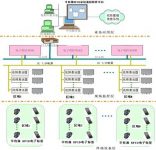
Sh-rw hospital patient intelligent management system application case
[ad_1]
1. System significance
1) Timely grasp the patient’s real-time information and management of the patient’s location;
2) When a patient has a sudden illness, notify the attending doctor and nurse in time through location information to avoid delays in medical services. The best time to miss is the opportunity to effectively improve the safety management of the patient;
3) Effectively control the patient to leave the ward or even the hospital without permission.
2. System architecture and program description
Through the address codes of the activators uploaded by different activated tags, it is possible to determine the situation of the personnel located near the different activators, including the number of personnel, names, positions and other information. In this way, no matter where people go, they will be locked by a local activator to determine their specific location, and the information will be uploaded to the management center in time, and the management center will go through a series of transformations to obtain relevant results. At the same time, it also easily accomplished our established goal, which is to manage the regional positioning of personnel.
2.1 System architecture

System network architecture
2.2 Program description

Schematic diagram of system network structure
RFID semi-active technology is used for personnel area location management. In each monitored area, such as each room, install low-frequency activators. Each low-frequency activator has 4 or 6 activation antennas, adjacent 4 or 6 Each room can share a low-frequency activator. In our positioning system, the low-frequency activator antenna is the smallest base point. A tag is activated within the range of 3-3.5 meters from the activator, and its positioning accuracy can be described as 3-3.5 meters. Activators in different areas have their own unique address codes. When a person enters the positioning base station with a semi-active low-frequency activation tag and is activated, the tag works normally. It sends the ID number of the tag to the outside world and also sends out the activation tag’s ID number. The address code of the activator, in this way, through the address code of the activator, we can locate the location of the tag. When the tag is taken from one activator to another location, the uploaded activator address code will also change accordingly, thus forming a complete positioning system. The data uploaded by the tag is received by a large-scale positioning base station gateway, and the information is uploaded to the management center for processing, completing the entire positioning system.
Three, typical cases
Shanghai Jiading Mental Hospital
Changzhou 102 Hospital
[ad_2]



